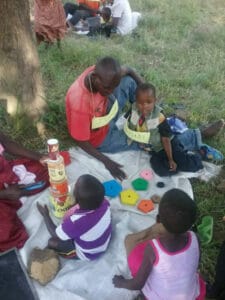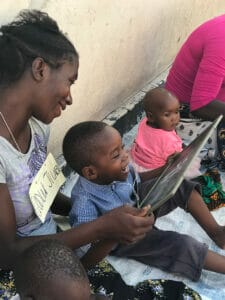News > Blog
Never Too Early to Learn: Engaging Parents as Teachers in Tanzania
Published 11/26/2018 by Global Communities

For years, Juma Mazaba Motoka has confidently served as the head of a small sub-village in Tanzania. But only recently did the 40-year-old father come to embrace another leading role.
“Earlier I thought the activity of teaching children was only for teachers who are well-trained and psychologically prepared to teach young children at school,” Juma said. “Now I realize that teaching children is not only a teacher’s responsibility but the responsibility of all parents.”

Juma and his son Masudi participate in a First Teacher Group session in Tanzania.
Juma is participating in Project Concern International’s (PCI) parent-centered pilot project that provides caregivers of children 3 to 5 years of age with new knowledge, skills, and inspiration to promote early learning at home. Each week, he and 11 other moms and dads bring their young children to a First Teacher Group (FTG), where a trained community volunteer facilitates interactive learning and play sessions between the participants.
Activities and demonstrations focus on using locally available materials to encourage early child counting, stacking, writing, drawing, and identification of shapes, animals, and colors. Parents learn how to embody the role of “first teacher” and engage their children in more interactive, responsive, and loving ways.
“I make sure that during the week I keep four hours to teach my children,” said Godliva Jilabi, who started bringing two of her preschool-age children to FTG sessions last November. “… A free program has opened me up to new ways of thinking. If this continues, parents will change as I have changed.”
Like Juma, Godliva and her husband used to think that educating their children was solely the job of school teachers in the village. But after joining a FTG and witnessing how quickly their youngest child gained critical physical, cognitive, and socio-emotional skills, the once skeptical parents became ambassadors of the program.
“My two neighbors asked me how I am capable of sitting with my children and teaching them,” Godliva said. “When I told them about the FTG, they were also interested. Now they teach their children.”
Since October 2017, PCI has formed a total of 12 FTGs in 6 villages of the Bunda District, benefitting 135 parents and more than 155 children. Aside from participants like Juma and Godliva, local school teachers note positive changes brought about by the intervention as well.

Godliva and her son participate in a First Teacher Group session in Tanzania.
“This program is a redeemer to me and to other pre-primary school teachers in Tanzania,” said Madam Grace, a teacher for 8 years who mentioned the challenges related to school readiness and parental involvement. “… I expect the Tanzania society to receive [FTGs] positively, involving themselves in cross-checking the academic performance of their children at school. Parents are brought together by this program.”
Juma, who now serves as a volunteer facilitator, echoed Grace’s sentiments, adding that men in his community are beginning to realize their critical role in children’s development and early learning.
“Sometimes we blame teachers for not doing their job well without realizing that we also contribute to children’s achievements and failures,” he said. “… I am glad to be a volunteer for the PCI FTG program.”
Over the next year, PCI will scale up the FTG model in 34 new villages with inputs and engagement from district council officials and rural development authorities. Lessons learned from this second pilot phase will be shared with the government and used to refine the model and delivery strategies. The FTG model is one of several innovative approaches integrated within PCI’s broader McGovern-Dole International Food for Education and Child Nutrition Program funded by the U.S. Department of Agriculture. For more information, visit PCIGlobal.org/Tanzania.
Lauren Galvin, Victor Mapile, Amina Mgeni and Bundala Ngw’andu contributed to this story.




